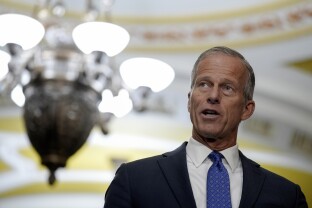After months of failed spending negotiations and a week-long legislative scramble, the Senate passed a government funding bill Friday to avert a shutdown that Senate Democrats desperately wanted to avoid and House Democrats thought was preferable to the legislation now headed for the president’s desk.
The Senate passed the bill 54-46 vote, after a handful of Democrats joined Republicans to support cloture on the legislation 62-38 vote. Senators will next vote on four amendments, all of which are expected to fail, before the bill heads to final passage.
Of the 10 Senate Democrats who joined Republicans in voting to advance the measure through cloture — Senate Minority Leader Chuck Schumer, Senate Minority Whip Dick Durbin and Sens. Brian Schatz, Catherine Cortez Masto, Maggie Hassan, John Fetterman, Gary Peters, Kirsten Gillibrand, Jeanne Shaheen and Angus King, an independent who caucuses with Democrats — only King and Shaheen voted for final passage.
Republican Sen. Rand Paul voted against cloture and final passage.
At the start of the week, no one was certain whether House Republicans could even send a bill to the Senate. But by Friday, after Republicans got their way on the legislation and Senate Democrats had completely capitulated, it was an unconditional win for the congressional GOP and President Donald Trump.
Meanwhile, Democrats were already pointing fingers over the situation, with most House Democrats blaming Senate Minority Leader Chuck Schumer for not standing strong and instead gathering support for a six-and-a-half month funding bill written by Republicans.
“I want to remind everyone it was Republicans that pushed this false shutdown choice,” Schumer said from the chamber moments before the vote (GOP Sen. John Cornyn, a few seats away, openly chuckled).
Some House lawmakers are now publicly lambasting Schumer’s decision. Others are privately calling for him to be primaried. Fellow New Yorker, Rep. Alexandria Ocasio-Cortez, was one of the most vocal critics. She called Schumer’s decision to back the GOP bill a “slap in the face” and a “betrayal.”
Schumer’s own members were more considerate. Moderate senators weren’t just between a rock and a hard place. They were between a funding bill they hated and a government shutdown that, some feared, was the endgame that President Donald Trump and Elon Musk ultimately wanted so they could continue to jettison pieces of the federal government.
“I’m a ‘no’ vote, but I understand where he’s coming from,” Sen. Peter Welch said on Friday. “Republicans have successfully put the country in a lose-lose position.”
Before the bill passed the House, Minority Leader Hakeem Jeffries tediously worked to keep his caucus aligned against it. Arguing that it was a regressive plan that would cause more harm than actually shutting down the government, Jeffries succeeded.
Frontline members in Trump-leaning districts all fell in line, despite being at risk of repercussions for essentially voting for a government shutdown. Only one member supported the bill — Rep. Jared Golden. Golden voted to support the bill after it was certain it would pass.
Once out of the House, members split town, jamming the Senate and leaving Democratic senators with a choice: Pass a bill they hate or shut down the government.
For most of the week, Schumer and his members insisted there was a third option. When reporters asked how they would vote, Democratic senators continually responded that they would vote for a month-long CR that would allow the parties to continue negotiations — a path that was unrealistic.
To tighten the screws, Speaker Mike Johnson planned to keep his members away from D.C. during recess in the event of a shutdown, pushing moderate Democrats further into a corner.
During multiple meetings, loud voices — bordering on yelling — were heard as members debated how to move forward. Each time they emerged, there was an increased air of despair. This was especially true on Thursday, when Schumer told his caucus that he would vote to avoid a shutdown.
The process for this bill greatly differed from the continuing resolutions conservatives long abhorred. Republicans pivoted from negotiating a clean CR with Democratic leaders when the Democrats demanded any bill include provisions preventing Trump from impounding government funds. GOP leaders balked and developed their own partisan bill that is not a true continuing resolution.
While Republicans referred to it as a continuing resolution, the bill will not continue current spending levels across the board. Several line items will be adjusted. It reduces spending by roughly $8 billion.
Pushing funding to the end of September clears the deck and allows Senate Republicans to fully focus on their other priority: reconciliation.
Republicans on the Senate Finance Committee discussed reconciliation when they met with Trump on Thursday at the White House. Lawmakers returning from that meeting had few concrete answers about where things currently stand within the process except to say that conversations are ongoing and there is no definite timeline.
“It’s all part of the process of working with the White House and the House to get to the end result,” Senate Majority Leader John Thune said on Thursday.
That conversation will quickly become the conference’s focus when they return to Washington. But they weren’t worried about those issues on Friday. Instead, Republicans relished the chance to watch their counterparts dissolve into disarray.
“I’m enjoying it a lot,” Cornyn told NOTUS. “They need a little anger management.”
—
Ben T.N. Mause is a NOTUS reporter and an Allbritton Journalism Institute fellow. Ursula Perano is a reporter at NOTUS. Katherine Swartz is a NOTUS reporter and an Allbritton Journalism Institute fellow.
Sign in
Log into your free account with your email. Don’t have one?
Check your email for a one-time code.
We sent a 4-digit code to . Enter the pin to confirm your account.
New code will be available in 1:00
Let’s try this again.
We encountered an error with the passcode sent to . Please reenter your email.


